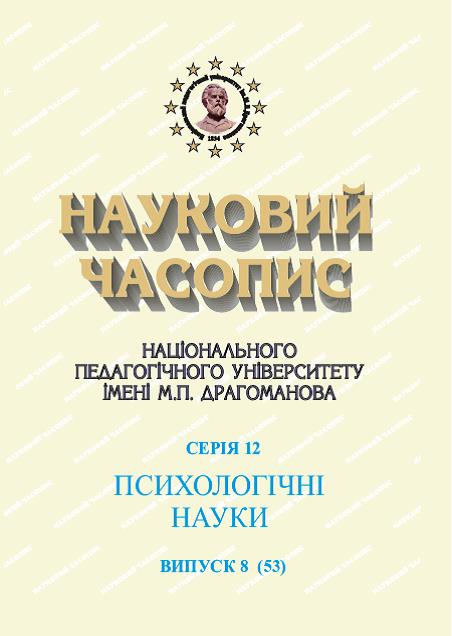PECULIARITIES OF DEVELOPMENT OF SOCIAL INTELLIGENCE PERSONALITY OF LATER YOUTH AGE
DOI:
https://doi.org/10.31392/NPU-nc.series12.2019.8(53).09Keywords:
social intelligence, ability, personality, late young age, mature ageAbstract
The article presents the results of empirical study of the features of social intelligence of late young age, in comparison with the social intelligence of mature age. The psychological meaning of the phenomenon of «social intelligence» is presented. In our understanding, social intelligence is a complex of personality’s abilities to know and solve problems that determine the success of its interactions with other people in society. The organization and methods of empirical research are described. The purpose of the study is to empirically study the peculiarities of the development of social intelligence of a personality of late young age. The achievement of this goal was facilitated by the application of the social intelligence test by authors J. Guilford and M. O’Sullivan in the adaptation of O. Mykhailova. A comparative analysis of the results of studying the general index of social intelligence and its basic constructs (ability to understand different life situations, manifestations of non-verbal and verbal behavioral expression and prediction of other people’s behavior) was conducted in the respondents’ of late young age and mature age. It has been empirically established that the personality of late adolescence is more likely to exhibit lower than average and average levels of knowledge of other people’s social behavior and adequate understanding of non-verbal and verbal manifestations of their behavior, as opposed to mature age. The personality of late young age is infrequently unable to properly analyze and predict the strategy of successful behavior, both of one’s own and that of others, compared to that of a mature age. It is not always the personality of late young age that can adequately understand the manifestations of verbal and non-verbal behavioral expression of other people, as opposed to the personality of mature age. In the late adolescence, the ability to predict other people’s behavior is much lower than that of a mature personality. The established peculiarities of the formation of social intelligence often hinder the success of social interactions of a personality of late adolescence, as opposed to a person of mature age.
References
- Vatina, E.V. (2006). Organizatsionno-pedagogicheskie usloviia formirovaniia sotsialnogo intellekta uchashchikhsia mladshego podrostkovogo vozrasta s nedorazvitiem poznavatelnoi deiatelnosti [Organizational and pedagogical conditions for the formation of social intelligence of students of younger adolescents with underdevelopment of cognitive activity]. Candidate’s thesis. Ekaterinburg [in Russian].
- Volodina, I. S. (2004). Spetsifika razvitiia sotsialnogo intellekta mladshikh shkolnikov s umstvennoi otstalostiu [The specifics of the development of social intelligence of younger students with mental retardation]. Candidate’s thesis. Sankt-Peterburg [in Russian].
- Gilford, Dzh. (1965). Tri storony intellekta. Psikhologiia myshleniia [Three sides of intelligence. The psychology of thinking.]. Moscow : Progress [in Russian].
- Egorova, O.N. (2014). Rol sotsialnogo intellekta v formirovanii deviantnogo povedeniia u umstvenno otstalykh podrostkov [The role of social intelligence in the formation of deviant behavior in mentally retarded teenagers]. Candidate’s thesis. Sankt-Peterburg [in Russian].
- Ivashkevych, E.Z. (2018). Psykholohiia sotsialnoho intelektu pedahoha [Psychology of the teacher’s social intelligence]. Doctor’s thesis. Kyiv [in Ukrainian].
- Klymchuk, V.O. (2009). Matematychni metody u psykholohii [Mathematical methods in psychology]. Kyiv : Osvita Ukrainy [in Ukrainian].
- Konovalova, N.L. & Solomakho, N.V. (2002). Osobennosti sotsialnogo intellekta u umstvenno otstalykh starsheklassnikov [Features of social intelligence in mentally retarded high school students]. InI. Iurev, L.A. Tsvetkovа (Eds.), Proceedings from Ach’ 02: Ananevskie chteniia: psikhologiia i politika (Tezisy nauchno-prakticheskoi konferentsii «Ananevskie chteniia – 2002») – Ananiev readings: psychology and politics (Theses of the scientific-practical conference «Ananiev readings – 2002») (рр. 71-72). Sankt-Peterburg : Izd-vo SPb un-ta [in Russian].
- Lobanov, A.P. (). (2003). Sotsialnyi intellekt: Problemy issledovaniia i diagnostiki [Social intelligence: Problems of research and diagnosis]. A.P. Lobanov, O.N. Podunova, & O.N. Kungurtseva (Comp.). Minsk : BGPU [in Russian].
- Melnyk, A.A. (2012). Rozvytok sotsialnoho intelektu ditei shkilnoho viku [Development of social intelligence of school children]. Candidate’s thesis. Kharkiv [in Ukrainian].
- Myloslavska, O.V. (2019). Sotsialnyi intelekt i mizhosobystisna zalezhnist u studentiv: hendernyi aspekt [Social Intelligence and Interpersonal Addiction in Students: A Gender Aspect]. Teoriia i praktyka suchasnoi psykholohii – Theory and practice of modern psychology, 1(1), 76-80. Retrieved from http://tpsp-journal.kpu.zp.ua/archive/1_2019/part_1/17.pdf [in Ukrainian].
- Mikhailova (Aleshina), E.S. (2001). Diagnostika sotsialnogo intellekta [Diagnostics of social intelligence]. Sankt-Peterburg : GP IMATON. [in Russian].
- Ushakov, D.V. (2004). Sotsialnyi intellekt kak vid intellekta [Social intelligence as a kind of intelligence]. D.V. Liusin & D.V. Ushakov (), Sotsialnyi intellekt: teoriia, izmerenie, issledovaniia – Social intelligence: theory, measurement, research (рр. 11–29). Moscow : Institut psikhologii RAN [in Russian].
- Ivashkevych, E. & Yatsjuryk, A. (2019). Psycholinguistic Study of Functioning of Cognitions and Metacognitions on the Levels of Social Intelligence. Psycholinguistics, 25(1), 90-106. https://doi.org/10.31470/2309-1797-2019-25-1-90-106
- Goleman, D. (2006). Social intelligence. The New Science of Human Relationships. New York : Bantam Books.

